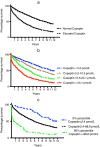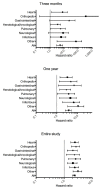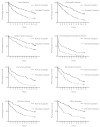Risk stratification in emergency patients by copeptin
- PMID: 24884642
- PMCID: PMC4053286
- DOI: 10.1186/1741-7015-12-80
Risk stratification in emergency patients by copeptin
Abstract
Background: Rapid risk stratification is a core task in emergency medicine. Identifying patients at high and low risk shortly after admission could help clinical decision-making regarding treatment, level of observation, allocation of resources and post discharge follow-up. The purpose of the present study was to determine short-, mid- and long-term mortality by plasma measurement of copeptin in unselected admitted patients.
Method: Consecutive patients >40-years-old admitted to an inner-city hospital were included. Within the first 24 hours after admission, a structured medical interview was conducted and self-reported medical history was recorded. All patients underwent a clinical examination, an echocardiographic evaluation and collection of blood for later measurement of risk markers.
Results: Plasma for copeptin measurement was available from 1,320 patients (average age 70.5 years, 59.4% women). Median follow-up time was 11.5 years (range 11.0 to 12.0 years). Copeptin was elevated (that is, above the 97.5 percentile in healthy individuals).Mortality within the first week was 2.7% (17/627) for patients with elevated copeptin (above the 97.5 percentile, that is, >11.3 pmol/L) compared to 0.1% (1/693) for patients with normal copeptin concentrations (that is, ≤11.3 pmol/L) (P <0.01). Three-month mortality was 14.5% (91/627) for patients with elevated copeptin compared to 3.2% (22/693) for patients with normal copeptin. Similar figures for one-year mortality and for the entire observation period were 27.6% (173/627) versus 8.7% (60/693) and 82.9% (520/527) versus 57.5% (398/693) (P <0.01 for both), respectively.Using multivariable Cox regression analyses shows that elevated copeptin was significantly and independently related to short-, mid- and long-term mortality. Adjusted hazard ratios were 2.4 for three-month mortality, 1.9 for one-year mortality and 1.4 for mortality in the entire observation period.
Conclusions: In patients admitted to an inner-city hospital, copeptin was strongly associated with short-, mid- and long-term mortality. The results suggest that rapid copeptin measurement could be a useful tool for both disposition in an emergency department and for mid- and long-term risk assessment.
Figures



Similar articles
-
Copeptin and peroxiredoxin-4 independently predict mortality in patients with nonspecific complaints presenting to the emergency department.Acad Emerg Med. 2011 Aug;18(8):851-9. doi: 10.1111/j.1553-2712.2011.01126.x. Acad Emerg Med. 2011. PMID: 21843221
-
Copeptin, C-reactive protein, and procalcitonin as prognostic biomarkers in acute exacerbation of COPD.Chest. 2007 Apr;131(4):1058-67. doi: 10.1378/chest.06-2336. Chest. 2007. PMID: 17426210
-
Copeptin and risk stratification in patients with acute dyspnea.Crit Care. 2010;14(6):R213. doi: 10.1186/cc9336. Epub 2010 Nov 24. Crit Care. 2010. PMID: 21106053 Free PMC article.
-
The role of copeptin as a diagnostic and prognostic biomarker for risk stratification in the emergency department.BMC Med. 2012 Jan 20;10:7. doi: 10.1186/1741-7015-10-7. BMC Med. 2012. PMID: 22264220 Free PMC article. Review.
-
Association Between Circulating Copeptin Level and Mortality Risk in Patients with Intracerebral Hemorrhage: a Systemic Review and Meta-Analysis.Mol Neurobiol. 2017 Jan;54(1):169-174. doi: 10.1007/s12035-015-9626-z. Epub 2016 Jan 5. Mol Neurobiol. 2017. PMID: 26732599 Review.
Cited by
-
Availability of suPAR in emergency departments may improve risk stratification: a secondary analysis of the TRIAGE III trial.Scand J Trauma Resusc Emerg Med. 2019 Apr 11;27(1):43. doi: 10.1186/s13049-019-0621-7. Scand J Trauma Resusc Emerg Med. 2019. PMID: 30975178 Free PMC article. Clinical Trial.
-
Copeptin in patients with heart failure and preserved ejection fraction: a report from the prospective KaRen-study.Open Heart. 2015 Nov 3;2(1):e000260. doi: 10.1136/openhrt-2015-000260. eCollection 2015. Open Heart. 2015. PMID: 26568833 Free PMC article.
-
Plasma copeptin for short term risk stratification in acute pulmonary embolism.J Thromb Thrombolysis. 2016 May;41(4):563-8. doi: 10.1007/s11239-015-1284-5. J Thromb Thrombolysis. 2016. PMID: 26438275
-
Risk assessment models for potential use in the emergency department have lower predictive ability in older patients compared to the middle-aged for short-term mortality - a retrospective cohort study.BMC Geriatr. 2019 May 16;19(1):134. doi: 10.1186/s12877-019-1154-7. BMC Geriatr. 2019. PMID: 31096925 Free PMC article. Clinical Trial.
-
Use of the prognostic biomarker suPAR in the emergency department improves risk stratification but has no effect on mortality: a cluster-randomized clinical trial (TRIAGE III).Scand J Trauma Resusc Emerg Med. 2018 Aug 28;26(1):69. doi: 10.1186/s13049-018-0539-5. Scand J Trauma Resusc Emerg Med. 2018. PMID: 30153859 Free PMC article. Clinical Trial.
References
-
- Hing E, Bhuiya F. Wait time for treatment in hospital emergency departments: 2009. NCHS Data Brief. 2012;102:1–8. - PubMed
-
- Richardson DB. Increase in patient mortality at 10 days associated with emergency department overcrowding. Med J Aust. 2006;184:213–216. - PubMed
-
- Katan M, Morgenthaler N, Widmer I, Puder JJ, Konig C, Muller B, Christ-Crain M. Copeptin, a stable peptide derived from the vasopressin precursor, correlates with the individual stress level. Neuro Endocrinol Lett. 2008;29:341–346. - PubMed
MeSH terms
Substances
LinkOut - more resources
Full Text Sources
Other Literature Sources

